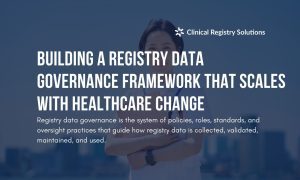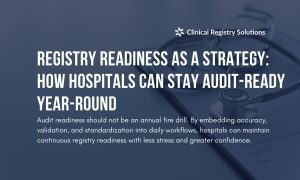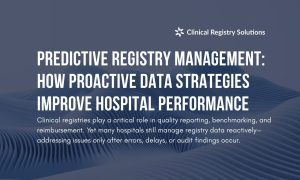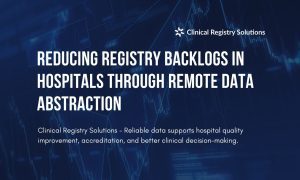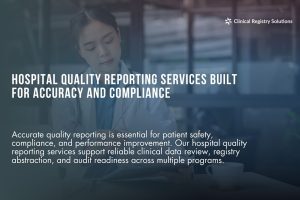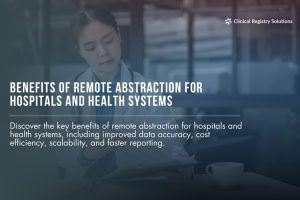Data abstraction is often the answer to your questions about how medical records are connected with public health or hospital ratings. They convert dense clinical documentation to structured data, which drives insight, improves the quality of care, and helps with accreditation.
The demand for data abstraction specialists is increasing as healthcare moves towards a data-driven model. A report from the U.S. Bureau of Labor Statistics states that employment in data management positions for healthcare is projected to increase much faster than the average until 2032. It is a great career choice for those who are detail-oriented and interested in healthcare analytics.
Understanding the Role of a Data Abstractor
It is essential to know what data abstractors do before diving into the training options. Data abstractors are essentially those who review patient records and enter key clinical information, such as diagnosis, procedure, and outcome, into standardized reporting or registries.
Consider them translators for medical data. They link clinical care and operational performance.
This role is essential in hospitals because it:
- Programs like STS and NSQIP, as well as MBSAQIP and NCDR, are accredited.
- Research and quality improvement
- Benchmarking performance
- Reporting on regulatory matters
The accuracy of their data directly impacts how hospitals achieve quality standards and ultimately improve outcomes for patients. Just precision, no pressure.
Why Professional Training for Data Abstractors Matters
Your skills should also not stand still. The healthcare industry is constantly evolving, so neither should you. Training Program for Data Abstractors offers the standards and structure needed for abstracting work, especially across national registers.
What can you expect from such professional training?
- Provides a foundational understanding of healthcare data systems, registries, and databases
- Improves accuracy and consistency by aligning to industry metrics such as Inter-Rater Reliability Standards (IRR).
- Increases employment opportunities for hospitals, quality departments, research organizations, and other organizations
- prepares you to specialize, such as in cardiology, oncology, or pediatrics.
This training is a great way to start a long-term career in healthcare data, with the flexibility and potential for growth that are not found within traditional clinical roles.
What to Expect in Healthcare Abstraction Certification Programs
It can be confusing to choose between Health Abstraction Certification Programs, but there are some common elements. The programs usually include:
- Introduction to Medical Terminology and Coding Systems
- Guidelines and protocols for registry abstraction , Specific to MBSAQIP, NSQIP programs
- Training on EMR software and Registry Software
- Audit and Quality Assurance Modules
- Practice exercises for Inter-Rater Reliability
Some programs include clinical mentoring or simulations of abstraction cases as a way to assess real-world readiness. There are easy to use question banks such as Data Abstractor Academy (www.dataabstractoracademy.com).
Duration and Structure
The majority of certification programs are 8-12 weeks long and available online or in a hybrid format. You can work full-time and progress according to your schedule.
Eligibility
Some programs accept nurses, health professionals, or those with previous experience in medical records. Attention to detail, clinical workflows, and a thorough understanding are equally important.
How Clinical Registry Abstraction Workshops Build Real-World Skills
Theoretical accuracy is another thing. Accuracy of real-world abstraction is quite another. Clinical Registry Abstraction Workshops can help.
Workshops that focus on Clinical Data Abstraction Training help bridge the gap between theory and practice, providing you with practical exercises and feedback to sharpen your ability to extract precise data that meets registry and accreditation requirements. The workshops will provide you with the opportunity to learn through case studies and practical exercises.
- EMRs can be complex.
- Identifying relevant fields across different documentation formats
- Abstraction of data according to registry definitions, benchmark criteria, and standards
- Ensure accuracy of submission
Learn how the integrity of data impacts larger outcomes, such as national performance metrics or quality reports.
These workshops are a great way to bridge the gap between classroom learning and real-world performance. These workshops help new and experienced professionals improve their data collection accuracy, while also helping them understand “why” each point of information is collected.
Career Opportunities After Professional Training for Data Abstractors
Your new skills can lead you in many directions once certified. Abstractors are needed by healthcare organizations across the country to manage their compliance and registry programs.
Common Career Roles:
- The Clinical Data Abstractor
- Register Coordinator
- Specialist in Quality Improvement
- Data Validation Associate
- The Clinical Outcomes Analyst
Common Practice Areas:
| Specialty | Registry Programs Supported |
| Cardiology | STS, NCDR, GWTG |
| Surgery | NSQIP, MBSAQIP |
| Vascular | VQI |
| Pediatrics | PC4, PAC3 |
| Oncology | NCDB |
What’s the best thing? Since many abstractions can be completed using EMR secure access, these roles allow for remote work or hybrid models. Many hospitals, data management firms, and CROs hire professionals with training to handle multiple registries.
How to Choose the Right Training Program
All programs are not created equal. Consider the following when selecting a Training Program for Data Abstractors.
- Alignment with industry -Make sure the program is aligned with real registry requirements.
- Qualifications of Instructors Trainers who have experience in a clinical registry or CTR certification can be trusted.
- IRR-based evaluation – Look for programs that measure performance using standards of inter-rater reliability.
- Support after training – Accessing mentorship and community forums to promote continued learning.
- Integrate your training with your goals -Select flexible courses that align with current roles or plans for transition.
You should be able to abstract accurate data, ready for auditing and reporting quality standards.
Training Trends: From Traditional Classrooms to Digital Learning
The technology continues to change the way that abstractors are trained. Virtual learning platforms offer interactive case studies and screen-sharing demonstrations like Data Abstractor Academy (www.dataabstractoracademy.com).
Some organizations combine these modules online with Training sessions for Clinical Data Abstraction tailored to internal workflows. The combination of these modules allows teams to remain aligned and efficient while maintaining consistency. This is important when there are multiple abstractors working on a registry.
Tips for New Data Abstractors
It can be overwhelming to start out. You can grow by taking these steps:
- Early on, get familiarized with the tools for reviewing medical records.
- Create a library of registry specifications that you use.
- Keep track of your accuracy over time.
- Join a community of peers to continue your learning.
- Register definitions change frequently.
It’s not about the speed, but rather about knowing what each patient has to say.
The Takeaway
Data is the lifeblood of healthcare, and data relies on you. Investing in professional training for data abstractors will pay off over the long term, whether you are starting a career or moving up within the healthcare administration.
Gain measurable skills, gain new opportunities for remote work, and improve the quality of care.
Clinical Registry Solutions continues to provide support for healthcare professionals and organizations nationwide by providing education, registry management, and training, which ensures accuracy, compliance, and audit-ready accuracy.
Let’s start to explore more resources and professional support.
FAQs About Professional Training for Data Abstractors
1. How do I qualify to enroll in Professional Training for Data Abstractors (PTDA)?
The majority of programs look for candidates who have a healthcare background, such as in nursing, medical coding, or HIT. Strong data analysis and attention to detail can make you an excellent fit.
2. What is the time required to finish certification programs in Healthcare Abstraction?
The length of the program varies from 8-20 weeks, depending on specialization and depth. Working professionals can choose from flexible online options.
3. Does the Clinical Registry Absorption Workshop include EMR hands-on training?
Yes. The majority of workshops will include question banks (www.dataabstractoracademy.com), EMR simulations or exercises. These are aimed at navigation, abstract rules, and document accuracy.
4. Does certification make it necessary to be a data abstractionist?
Certification is not required everywhere, but it gives you an edge in the market by demonstrating that your data accuracy and compliance are high, as well as your dedication to patient care.
5. After completing the Professional Training for Data Abstractors Program, can I work from home?
Most hospitals and health care firms offer remote abstracting roles to certified professionals with IRR and registry experience.
